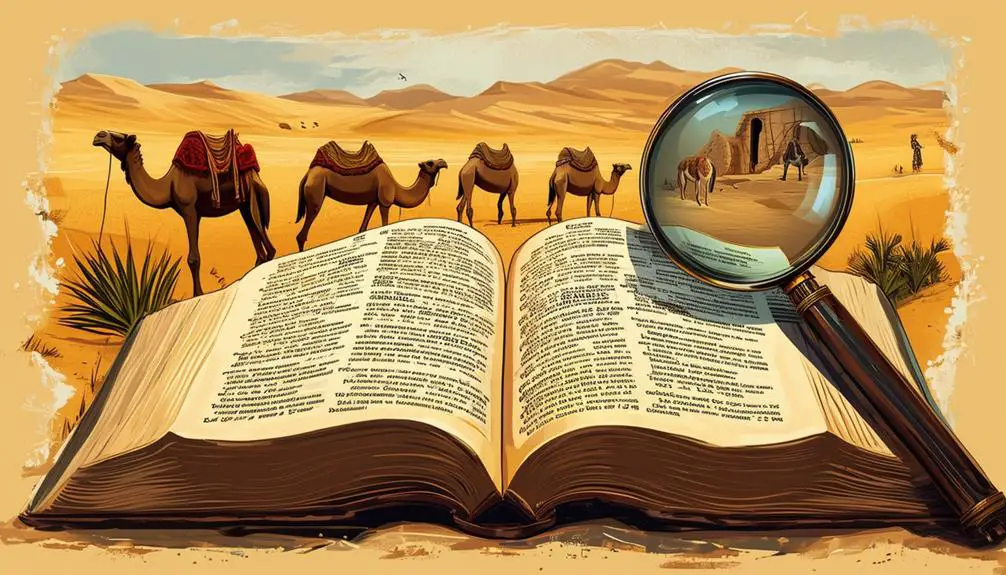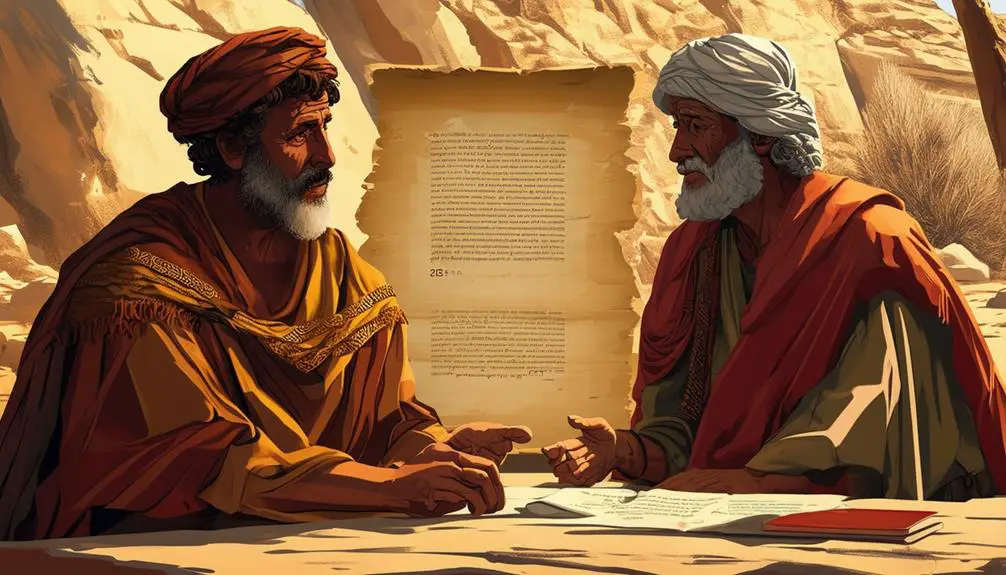Unravel the complexities of faith, diplomacy, and divine promises in Genesis 23, where Abraham's trials following Sarah's death reveal layers of cultural and spiritual insights.

Bible Study – The Book of Genesis – Chapter 23 – Summary and Analysis
In Genesis 23, you traverse Sarah's death and Abraham's ensuing distress. As Sarah's spiritual matriarchal legacy closes, Abraham's unwavering faith is tested during negotiations for a burial site. His diplomacy highlights both cultural customs and covenant commitment. Purchase of the Machpelah cave reveals Abraham's respect for Hittite law and his confidence in divine providence, marking a commitment to future generations. Alongside historical value, this chapter offers symbolic interpretations offering deeper understanding. So, immerse deeper, and uncover how loss, faith, and burial rites intertwine in the Abrahamic narrative, revealing divine promise continuity and trust in God's covenant.
Key Takeaways
- Genesis 23 showcases Abraham's grief and faith after Sarah's death, emphasizing his enduring belief in God's covenant.
- Sarah's passing signifies a pivotal shift, reflecting her important role as a spiritual matriarch and a key female prophet in biblical history.
- Abraham's negotiations for Sarah's burial site highlight his wisdom, patience, and respect for Hittite customs, asserting his faith in God's promise of the land.
- The purchase of Machpelah, a burial site, symbolizes Abraham's trust in divine providence and his commitment to honor ancestors and future generations.
- Genesis 23 reveals cultural traditions of the time, underscoring the significance of burial practices, land ownership, and the continuation of divine promises.
Overview of Genesis Chapter 23

In Genesis Chapter 23, you'll uncover a pivotal moment in biblical history that explores a crucial aspect of Abraham's life and experiences, particularly focusing on the emotional turmoil he faces with the death of his beloved wife, Sarah. This chapter, secluded in its Genesis context, stands as a testament to the humanistic portrayal of characters within the scripture, emphasizing their palpable grief and resilience in the face of loss.
The chapter's significance is manifold. It not only underscores Abraham's personal loss but also highlights his negotiation skills and unwavering faith in God even amidst profound sorrow. As you explore the text, you'll identify the themes of mortality and legacy intertwining. Abraham's efforts to secure a burial site for Sarah manifest his concern for honouring her memory, thereby underscoring the importance of rituals in dealing with grief.
Furthermore, Genesis Chapter 23 also lays the groundwork for the future generations of Abraham, hinting at the divine promise of a land and a lineage. Hence, the narrative, although centered around a death, paradoxically seeds hope for continuity and reaffirms God's promise to Abraham.
Sarah's Death: Verse Analysis
In exploring Genesis Chapter 23, you're confronted with the poignant event of Sarah's death. The interpretation of this event, its implications, and its profound impact on Abraham invite your thoughtful inquiry. Through an analytical lens, consider how this seminal passage shapes the narrative and spiritual tenor of Genesis.
Sarah's Passing: Interpretation
What's the deeper meaning behind Sarah's passing as depicted in Genesis Chapter 23? Sarah's Legacy, as presented in the book, isn't just about her death but also her impact as one of the Bible's key female prophets. Her passing symbolizes the shift of an era, marking the end of the first generation of the Abrahamic covenant. Through her life, she demonstrated faith, obedience, and resilience, especially in challenging situations. This makes her a significant figure, not just as Abraham's wife, but as a spiritual matriarch. Her prophetic role also emphasizes the importance of female voices in religious narratives. Therefore, Sarah's passing isn't merely an event; it's a powerful testament to her life and influence, a pivotal point in biblical history.
Impact on Abraham
Moving beyond Sarah's legacy, let's consider how her death impacted Abraham, her lifelong companion and the patriarch of their faith. Abraham's mourning is palpable in Genesis 23, reflecting not only his personal loss but also a pivotal moment in the narrative of their shared destiny. Abraham's sorrow is profound, yet his actions following Sarah's death reveal a steadfastness in the patriarch's faith. Despite his grief, Abraham negotiates for a burial site, ensuring a resting place for Sarah while also establishing a permanent presence in the promised land. This act exemplifies his unwavering faith in God's covenant, even amidst profound personal loss. Sarah's death, while a moment of deep sorrow, also becomes a testimony to Abraham's enduring faith and commitment.
Abraham's Negotiations: A Closer Look

Delving into Abraham's negotiations, you'll find an intricate tapestry of diplomacy that showcases his faith, patience, and wisdom. Genesis 23 provides a rich narrative that not only illuminates Abraham's character but also subtly highlights the covenant significance. The importance of the covenant, the divine agreement between God and Abraham, is underscored here. Abraham's negotiations not only secure a burial place for Sarah but also affirm his obedient faith in God's promise of land.
These negotiations also vividly depict cultural customs of the time. It's fascinating to see Abraham's humble approach, respecting the Hittites' customs and norms. His deference to their decision-making process, his willingness to pay the full price for the land, all reflect the cultural norms of his time, thereby providing a window into the societal practices.
Moreover, the narrative demonstrates Abraham's wisdom and patience. He doesn't rush the process or use his divine covenant to assert dominance. Instead, he carefully navigates through the negotiations, using tact and respect. This chapter illustrates Abraham's tactful negotiations, reflecting his strong faith, wisdom, and patience, while simultaneously shedding light on the societal customs of the era.
Purchase of Machpelah: Detailed Examination
In examining the purchase of Machpelah, you'll find it's a significant event that mirrors the multifaceted character of Abraham and explicitly marks the fulfillment of God's promise. The narrative spotlights Abraham's unique blend of humility and determined negotiation skills, which result in the acquisition of the cave and adjoining field from Ephron the Hittite.
The cave's significance is twofold. To begin with, it's a tangible symbol of Abraham's faith in God's promise of land ownership. Despite being a sojourner, he secures a permanent burial place, demonstrating his belief in God's covenant of land to his descendants. Additionally, it underscores the human necessity of mourning and honoring the dead, a universal ritual across cultures and epochs.
The Machpelah ownership raises interesting questions. Abraham's insistence on a legal purchase, documented in the presence of Hittite elders, emphasizes his respect for their customs and laws. This public transaction also secures that his descendants have a legitimate claim to the property, eliminating future disputes.
Symbolic Interpretations in Genesis 23

Through an examination of Genesis 23, you'll find that beneath the surface of the text, there's a rich tapestry of symbolic interpretations waiting to be unraveled. One key element to ponder is the cave symbolism. The cave of Machpelah, which Abraham purchases as a burial site, is not merely a physical location. It's a symbolic representation of the shift from this life to the afterlife, a gateway of sorts. This liminal space is a common motif in religious texts, representing the boundary between the known and the unknown.
Cultural traditions also play an important role in understanding Genesis 23. Abraham's insistence on buying the land, despite Ephron's initial offer to give it for free, reflects the significance of ownership and the respect for property in ancient societies. It also embodies his dedication to God's promise of a homeland for his descendants.
Moreover, the burial of Sarah signifies a cultural practice that honors the dead while also affirming the living's connection to the land. It symbolizes the end of one chapter, the passing of the matriarch, and the continuation of the divine promise through the living. Through these symbols, Genesis 23 provides profound insights into the human and divine experiences.
Personal Reflections and Lessons
Reflecting on Genesis 23, you'll uncover personal lessons embedded in this biblical narrative that can provide guidance for contemporary life. This chapter, rich with Faith Reflections, can be a catalyst for your Spiritual Growth.
- Faith in Difficult Times: The death of Sarah was a difficult time for Abraham. Nevertheless, his faith was unwavering. He sought a burial place, negotiating in a foreign land. You can draw strength from his faithfulness during trials. Even in your darkest hours, you can lean on your faith to guide you.
- Respect and Dignity for the Deceased: Abraham's negotiation with the Hittites for a burial site was done with utmost respect and dignity. This serves as a lesson to treat the departed with honor and respect, reflecting the value of every life.
- Trust in God's Promises: Abraham, in purchasing the burial site, was asserting his belief in God's promise of the land. This can inspire you to trust in God's promises, even when they seem distant.
In examining Genesis 23, you'll find that it is more than a historical account. It is a guide, filled with lessons that can spur your spiritual growth and deepen your faith reflections.
Frequently Asked Questions
What Can We Learn From Abrahams Character in Chapter 23?
In Genesis Chapter 23, you'll see Abraham's integrity shines through. He's respectful during negotiations for Sarah's burial site, exhibiting honorable conduct even in grief. His actions teach you the importance of maintaining your dignity and honoring commitments, regardless of circumstances. This chapter paints a picture of Abraham as a role model for conducting oneself with grace and respect, even when faced with challenging situations.
How Does Genesis Chapter 23 Relate to Modern Christian Life?
In Genesis 23, you observe Abraham's mourning practices, which can inform your own responses to loss. Cultural interpretations weave into this, showing respect for the deceased like Abraham did for Sarah. You're reminded of your mortality and the importance of faith during trials. It's about living a life of integrity, respecting others, and trusting God – values still relevant to your modern Christian life.
What Are Some Common Misconceptions About Genesis Chapter 23?
You might believe Genesis 23 merely records Sarah's death, overlooking Sarah's legacy and the cultural context. It's not just about death, but also about Abraham's faith and his commitment to God's promises. The purchase of the burial cave demonstrates this. Don't dismiss it as irrelevant to today's world. It's a profound reflection on faith, legacy, and God's promises that still resonate in modern Christianity.
Are There Any Controversial Aspects in Genesis Chapter 23?
Yes, Genesis 23 can stir controversy, particularly regarding Sarah's burial and the cave negotiations. You might question Abraham's determination to pay for the burial site, despite it being offered for free. This could be seen as a symbol of his independence and refusal to be indebted. The prominence of economic transactions in such a solemn moment can also be controversial. It's about interpreting the text in its historical and cultural context.
How Does Chapter 23 Connect With the Following Chapters in Genesis?
You'll see Chapter 23's continuity in the Genesis progression as Abraham's journey evolves. After Sarah's death and burial in chapter 23, events shift to finding a wife for Isaac in chapter 24. The subsequent chapters trace Isaac's life, creating a seamless narrative flow. Understanding the connections between these chapters provides a holistic view of the faith journey of Abraham's family and the unfolding of God's promises to them.



Sign up